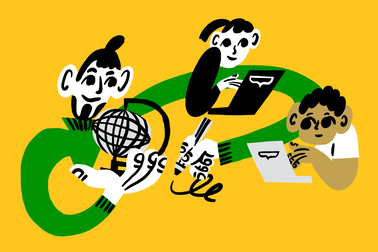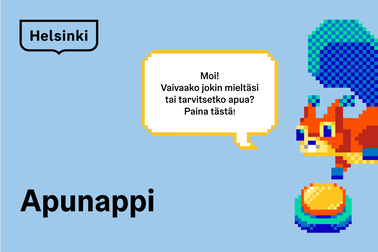
Pupils not allowed to use mobile devices during lessons without permission
From this school year on, Helsinki comprehensive school pupils are not allowed to use phones, tablets, headphones, watch phones or smartwatches during school lessons, except for learning purposes with the permission of the teacher. However, a mobile device can also be used as a learning aid or for health reasons, with the permission of a teacher or principal. Instructions on the use of mobile devices during breaks, transitions and lunches will also be issued.
“We want to promote learning environments that support learning, concentration and wellbeing and limit use of mobile devices during the school day," says Head of Education Division Satu Järvenkallas.
The use of mobile devices is also prohibited during school lunches, and all schools designate at least some recess time as mobile-free. Schools will inform pupils’ parents and guardians about the school-specific policies at the beginning of the school year at information events and via Wilma. The school year in Helsinki begins on Thursday, 7 August 2025.
“We recommend that mobile devices should not be used at all during lunches, recess and transitions. However, individual schools may have different rules on the use of smartphones during recess for pupils of different ages. This could mean that pupils in grades 1–6 are not allowed to use their smartphones during recess, but pupils in grades 7–9 are allowed to use them during one recess, for example," say Head of Basic Education Ville Raatikainen and Head of Swedish-Language Basic Education Niclas Rönnholm about the different possible implementations.
Comprehensive schools can offer phone lockers for pupils, in which case the school is responsible for the mobile devices stored in them for the duration of the school day. If the school rules instruct pupils to keep their mobile devices in their backpacks or in the pupil’s possession, the pupil is responsible for the device.
The changes to school rules were drafted based on shared discussions with school staff and pupils in spring 2025. In addition to this, schools also asked parents and guardians for their opinions through surveys. The changes to school rules have been approved by school boards.
Helsinki is prepared for the changes in learning support
As a result of legislative changes, the organisation of learning support will change as of 1 August 2025 in pre-primary education, basic education and general upper secondary education. The changes are aimed at clarifying and harmonising the forms of support provided. All learners will continue to have the right to learn and receive support throughout their learning path. Helsinki started adopting the changes as early as last autumn.
The focus of support in learning and school attendance will be moved to proactive and early support. In the future, priority will be given to group-specific support, which all pupils will have the right to.
Various teaching arrangements and pedagogical solutions can be used to take slower and quicker learners into account. In addition to support provided in groups, pupils can receive individual support measures, such as instruction provided by a special educational needs teacher.
“Even though these new changes to providing support are significant, the survey on our school staff showed that staff feel that we are already doing things the way that the new legislation stipulates. “We have already assessed the need for pupils' support from the perspective of the new law, and we have reviewed and planned the existing resources of our school and their allocation in a new way,” says Principal of Suutarinkylä Comprehensive School Paula Järnefelt.
The 2025–2026 school year will be a transition period, meaning that the way support is provided will not change immediately at the start of the school year in August. At best, the legislative changes will bring clarity and make support tangible for the pupil. In addition to basic education, arrangements for support for learning will also change in pre-primary education and general upper secondary education as of 1 August 2025, and one year later in vocational education and training.
Improving literacy and basic skills
In basic education, the aim is to strengthen learners' core knowledge and skills, as well as the development of social and emotional skills. This school year, Helsinki schools will focus on improving reading skills, in particular, and increasing instruction in mother tongue, literature and mathematics. Robust literacy skills form the basis for all other learning processes and the development of other literacy skills, meaning that it is essential to learn reading and writing skills at the start of comprehensive education. Comprehensive schools systematically promote motivation for reading and the development of reading skills as part of the school day.
According to the Government Programme, the minimum number of hours of basic education will be increased by three hours per week to support the learning of basic literacy and numeracy skills. In Helsinki, this will be implemented by adding one weekly lesson of mother tongue and literature instruction per year in grades 1 and 3 and one weekly lesson of mathematics instruction per year in grade 2 in all Finnish- and Swedish-speaking municipal schools this school year. No new objectives or content will be added to the national core curriculum for mother tongue, literature or mathematics.
“This means that learners will be given more time to learn things while learning objectives are kept at the current level," Raatikainen says.


